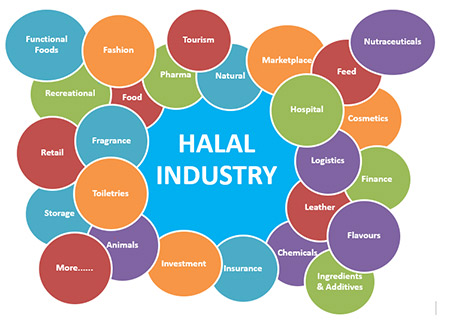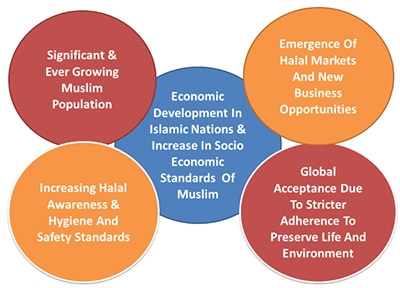Halal
Halal is just an Arabic word that means "Permitted or Lawful". It is a law that defines what can be consumed by humans for their own safety and sustainability. It is not limited to meat or just foods but includes all the products and services as well. It is simply a way for healthy, sustainable, ethical, responsible, peaceful and meaningful life. It is a lifestyle which revolves around the principles of preservation of life and being humane. Whether you choose to call it by some other name like lawful, pure or permitted but if the concept remains same then it is halal. Halal by definition is not restricted for the people of a certain religion only. Even people from other religion do consume halal products, the products that are safe for human consumption.
The concept 'Halal' has gained significant prominence and created a status for itself in the global economy and nowadays one way or the other it has appreciable presence in every human life and society. Now Halal is not just a Life style but it has evolved and prospered into a very dynamic, flourishing and perforating global industry. With its application & implications in all different commercial sectors all over the world, development of Halal and its proper utilization for the industry has become imperative and momentously contributes to all facets of economic growth. Halal has made an impact on the ever growing global economy paving its way to being the new global market driving force.

Global Halal Force
Halal is a multi trillion dollar global force that is gradually penetrating each and every sector of business & life. At present it is estimated to be staggering $4.5 USD Trillion which comprises of $1.4 USD Trillion Halal Finances, $1.1 USD Trillion Halal Food, $224 USD Billion Halal Fashion, $150 USD Billion Halal Tourism, $95 USD Billion Halal Pharmaceuticals, $60 USD Billion Halal Cosmetics and others. Global Halal Food Market constitutes 16% of the total global food industry at present .It is growing exponentially at the rate of 6.9% which is faster than the general food sector. It will be 17.4% in 2018 and approximately 20% by 2030 with Asia, Africa & Europe share of 63%, 24% and 10% respectively. By 2018 it will worth $1.6 USD Trillion alone. The Global Muslim Tourism Expenditure is $126.124 Billion as in 2011 and growing at the rate of 4.79% will be $192 Billion by 2020 according to Global Muslim Lifestyle Travel Market 2012..

The increasing consciousness among Muslim about their religious, obligation to consume Halal products has been driving the halal industry growth curve upward as they began to demand more and more of halal alternatives. Also increased awareness about halal globally among non-Muslims has gradually led to association of halal with strict hygiene & ethical standard, especially in relation to animal welfare. Recognition of halal products as high quality in Muslim minority nation especially west has proven to be the catalyst for the growth of halal industry in the region. Global super market chains have began to include Halal products & Halal corners. Halal food demand among non-Muslim Dutch consumer is estimated to be around $3 USD Billion annually. Port of Rotterdam, one of the largest ports in Europe, is Halal certified and has a separate halal facility. Yiwu, China is one of the largest wholesale consumer goods market in China. To cater to its Muslim visitors they have made facility to provide prayers hall, halal food, etc among others. Nestle is the world's leading producer of Halal Certified Products with about 90 (approximately 20% of its total number of plants) being halal certified generating revenue of about $7 USD billion of halal food alone.